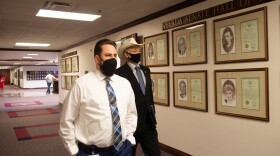With fewer than three weeks until the end of Nevada's 2021 legislative session, lawmakers are scrambling to make it to the finish line. KUNR Morning Edition host Noah Glick spoke with political editor Paul Boger to get the latest from Carson City.
Noah Glick: All right, so let's get back into Carson City here. What's been going on at the Legislature?
Paul Boger: It has been a busy couple of weeks, and let's just go ahead and talk about yesterday because apparently all the things had to happen yesterday.
First off, the death penalty ban that we talked about before, that is officially dead. ... That's because Governor Sisolak essentially put the kibosh on it yesterday. It appears that negotiations were going nowhere, and that's because you had progressives who wanted to abolish the death penalty in total [and] you had prosecutors who wanted to keep it intact. So apparently, negotiations were going nowhere, and the bill is dead. That's kind of one of the bigger news items.
Lawmakers dropped a big old energy bill yesterday. Day 103 of the session, we get a 90-page energy bill, but it is something that was discussed in the governor’s State of the State in January. ... Lawmakers want to encourage construction of renewable energy transmission lines and electrical vehicle charging stations. They really do see Nevada as this hub of green energy. They think that's a way to create jobs, to add money to the state's coffers. They're going to put about a $100 million investment into transportation electrification. They're going to be building electrical vehicle charging stations, not just in cities, but on the highway. This is going to be a major push that they're going to go for. Of course, they're going to have to pay for that somehow, and luckily we had the economic forum last week.
Glick: Tell me more about that.
Boger: Yeah, that painted a much rosier picture of the state's finances than what we got last year in December. Essentially, the state will have about an additional $900 million to play with. They'll collect about an additional $900 million in this fiscal year and then in the next two fiscal years. So, about $300 million this year, about $600 million in the next two. That's important because that's almost about the same amount of money that lawmakers had when they crafted the budget for the current biennium back in 2019. So, they're already making good on some of the cuts they made last year during the special session. Earlier this week, they voted to restore some of the cuts they made to Medicaid reimbursements. So already they're making decisions on how to use that [money].
Glick: Sure. And then there was, I have to ask, there was a Supreme court ruling yesterday regarding a set of tax bills passed last session. So essentially, you know, the court declared those particular taxes as illegal. Now I know you covered those bills in 2019. Could you just give us a little background as to what happened and how this decision is going to affect the budget?
Boger: I'll tell you, we don't really know how it's going to affect the budget yet because the budget's not fully written. We know that those taxes collected about $100 million over the last two years. That was through a government service fee and a DMV surcharge. Those were supposed to sunset or end over the last year or so. But lawmakers in 2019 decided they weren't going to change the language of the taxes or change how much was collected; they were just going to get rid of those sunsets. Essentially, they were going to extend the taxes into perpetuity. That's where they got into trouble. Republicans said that was, effectively, a tax increase. And so, they were not able to get any Republicans on board. Therefore, they lost the two-thirds vote by one vote; they needed to get one Republican. They were unable to do that. Republicans sued two years ago, and over the last two years, we've had this case. And just yesterday, the Supreme Court decided that those taxes were illegal and, therefore, that money needs to be returned.
Glick: Well, I know that there's been talk about that money being used for education. So, I'm just curious, you know, you reported this week that lawmakers are moving forward with the state's new pupil-centered funding program, and that's against the objections of the state's teachers union. So, what are the objections to that bill?
Boger: That's another bill that was passed in 2019 that we're talking about in 2021. Lawmakers passed the new funding plan in 2019, but they didn't decide how they were going to actually fund the mechanism [implementation] or the way that the money actually gets to the schools. So, that's what this bill does: it creates the formula and decides, “Okay, this pupil has these needs, he'll get this much money, versus this young lady over here. She doesn't have quite the educational needs of this young boy. So, a little less money will go to her.”
That's how it essentially works, but there are some issues with it in that to fully implement this plan is going to cost an additional $2 billion in state funding over the next 10 years. This bill doesn't add any money. It also freezes current funding of rural schools at current levels. So, they're not going to be promised any future increases in revenue under this new plan for those rural schools; it's going to send a lot more money to Clark County and really keep Washoe County about at its current level. So it's not a very popular plan in the rurals, and of course, you've got caps on the end-of-year balance, which the teachers union uses to negotiate teacher salaries, pensions and benefits.






